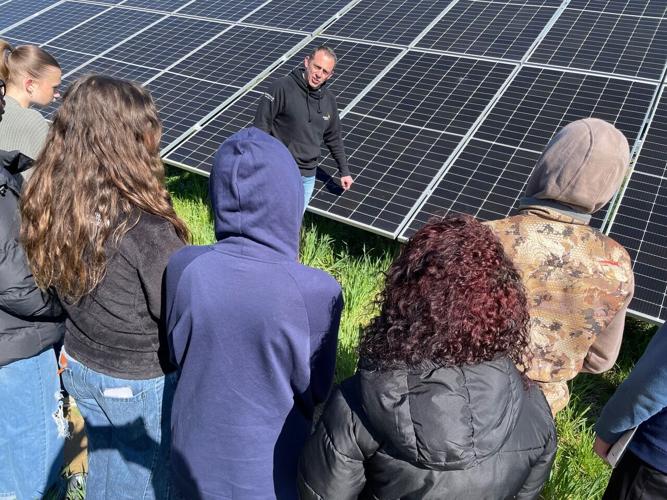ANNAPOLIS — Gov. Wes Moore (D) signed two prominent energy bills into law on Tuesday, bills largely opposed by Eastern Shore Republicans during this year’s Maryland General Assembly.
Senate Bills 931 and 937 were part of an expansive energy package lawmakers wrestled with this session. While Moore vetoed the package’s third bill, due in part to budgetary reasons, he put pen to paper for the others.
The Renewable Energy Certainty Act, or SB931, aims to increase the state’s solar generation by streamlining the regulatory process for solar projects. Specifically, it provides the Maryland Public Service Commission with approving authority for projects under the 2-megawatt threshold.
Tuesday, Senate President Bill Ferguson (D-Baltimore City) said the legislation creates “a clear path forward for solar and battery storage projects to eliminate local barriers and allow local government to join in community solar programs.”
“It is essential that we have more affordable and cleaner, Maryland-made energy,” Ferguson said.
But Eastern Shore legislators, as well as county representatives, don’t see it the same way.
Republican legislators unsuccessfully pushed for Moore to veto the bill amid concerns it strips away local control over solar project approvals and places too much authority at the hands of the Public Service Commission.
Caroline County Commission President Travis Breeding said it will override the county-instituted 2,000-acre solar cap.
Per the legislation, the Public Service Commission can grant solar project approvals on up to 5% of land designated for agriculture and forests. County leaders say the amount of land prone to solar development could quadruple.
“It’s going to change the landscape, it’s going to change the look of the county,” Breeding said in an interview, citing concerns on food production and agricultural jobs. “It’s going to change our economy.”
Breeding noted the commissioners are “pursuing solutions at the federal level” in the form of reaching out to Rep. Andy Harris (R-Md.). Breeding hopes there can be federal restrictions on solar project subsidies so developers “cannot offer these lucrative deals to entice landowners.”
SENATE BILL 937
The Next Generation Energy Act, or SB937, focuses on ratepayer relief after a winter of skyrocketing energy bills — a trend Ferguson said was a “wake-up call” and not just a “temporary spike.”
Ferguson noted $200 million will go toward ratepayer refunds — an average of $80 per household, Ferguson said, split between winter and summer payments.
The bill looks to increase in-state generation by trimming permitting processes as coal and oil plants reach their ends.
“We know that older coal plants and oil plants are being retired based on private action, and we have not built up enough alternative energy to fill it fast enough, and so the General Assembly had to act,” Ferguson said.
Del. Chris Adams (R-Caroline, Dorchester, Talbot, Wicomico) said the bill’s framework doesn’t do enough to incentivize nuclear energy or in-state generation. Adams and other Republicans have also disagreed with Democrats on the premise that the bill provides necessary relief to ratepayers.
“Maryland is still ... dependent on other states to bring us energy,” Adams said in an interview last week. “It’s expensive, and that sole political decision is what’s creating the ratepayer difficulties that we’re experiencing and will experience moving forward.”













(0) comments
Welcome to the discussion.
Log In
Keep it Clean. Please avoid obscene, vulgar, lewd, racist or sexually-oriented language.
PLEASE TURN OFF YOUR CAPS LOCK.
Don't Threaten. Threats of harming another person will not be tolerated.
Be Truthful. Don't knowingly lie about anyone or anything.
Be Nice. No racism, sexism or any sort of -ism that is degrading to another person.
Be Proactive. Use the 'Report' link on each comment to let us know of abusive posts.
Share with Us. We'd love to hear eyewitness accounts, the history behind an article.